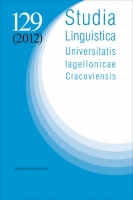Sorb self-stereotypes of the Sorb in Upper Sorbian proverbs
Sorb self-stereotypes of the Sorb in Upper Sorbian proverbs
Author(s): Renata BuraSubject(s): Language and Literature Studies
Published by: Wydawnictwo Uniwersytetu Jagiellońskiego
Keywords: Upper Sorbian language; Upper Sorbian phraseology; Upper Sorbian paremiology; national stereotypes; self-stereotype
Summary/Abstract: National stereotypes, as with any stereotype, are a simplified representation of the external world. These simplified images find their reflection and are preserved in the language, in words, metaphors, proverbs, and phraseology. In Upper Sorbian paremiology a self-stereotype of the Sorb is found, a man who primarily sees himself in a positive light, as good, honest, devoted and faithful. A “true” Sorb is also hospitable and pious. The most important component of the sense of identity is, however, the linguistic distinctiveness, which is stressed in the proverbs and expressions. The self-evaluation is formulated against a clear stereotype of the German, who is treated as a “foreigner”, as well as a symbol of oppression. This stems from the common history and the co-existence of the two nations. However, the image of the German emerging from the Upper Sorbian proverbs is not exclusively negative. There is no ethnocentrism in the Sorbs’ self-stereotype as, despite stressing their own positive traits, they are objective and have a critical attitude towards their own vices. A clearly negative feature of the Sorbs, which appears regularly in the collected material, is the imitation of German customs. In order to describe such representatives of the Sorbian nation a pejorative ethnonym Němpula is used
Journal: Studia Linguistica Universitatis Iagellonicae Cracoviensis
- Issue Year: 2012
- Issue No: 129
- Page Range: 49-60
- Page Count: 12
- Language: English

